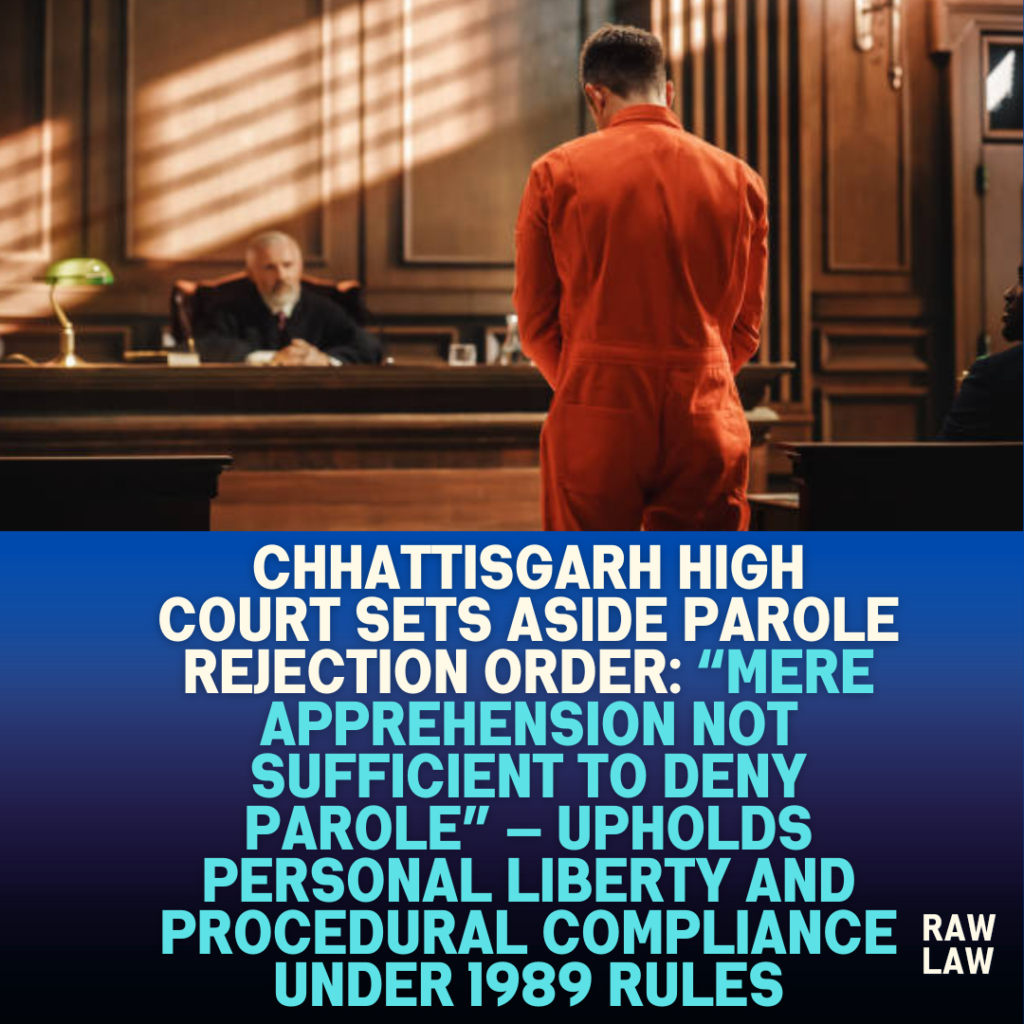Court’s Decision
The Chhattisgarh High Court allowed the writ petition challenging the rejection of parole by the District Magistrate. The Court held that the rejection was based solely on a vague apprehension of law and order problems, unsupported by material evidence or application of the Chhattisgarh Prisoner’s Leave Rules, 1989. Citing the Supreme Court decision in Shor v. State of UP, the Court observed that denying parole purely on the ground that the crime is heinous, or based on unsupported fears of potential disruption, is impermissible. The Court directed that the petitioner be released on parole for 14 days, subject to surety and daily reporting conditions.
Facts
The petitioner, who has been in custody since 22 October 2017, was convicted on 10 January 2022 under Sections 341, 302, 147, 148, and 149 of the Indian Penal Code. He sought parole from prison, which was rejected by the Collector-cum-District Magistrate, Balrampur, on 3 December 2024. The basis of rejection was the report from the Superintendent of Police, indicating that the petitioner’s release might disturb public order and threaten the victim’s family.
Issues
- Whether the rejection of parole based on a vague apprehension of law and order is sustainable under law?
- Whether the District Magistrate followed the mandatory provisions of the Chhattisgarh Prisoner’s Leave Rules, 1989 while rejecting the parole application?
- Whether the conduct of the prisoner and other statutory requirements were duly considered?
Petitioner’s Arguments
The petitioner argued that the District Magistrate’s rejection of parole was arbitrary and without adherence to Rules 4, 6, 9, 11, and 12 of the 1989 Rules. It was contended that the order merely echoed the concerns of the Superintendent of Police and failed to apply any independent judicial mind. The petitioner submitted that such vague fears were insufficient to deny parole, especially when the petitioner had already served a substantial period in prison and no material existed to suggest likely misconduct upon release.
Respondent’s Arguments
The State supported the impugned order, asserting that the release of the petitioner could lead to disturbances, as the victim’s family feared harm. The State further submitted that the petitioner’s criminal appeal had already been dismissed, and thus he was a convicted person with serious charges, justifying caution in granting parole.
Analysis of the Law
The Court carefully examined the Chhattisgarh Prisoner’s Leave Rules, 1989, especially Rule 4(e), which empowers the District Magistrate to seek surety from a family member. Rules 6, 9, 11, and 12 lay down the procedure for inquiry, grounds of rejection, and time-bound disposal of parole applications. The Court found that these rules were ignored while rejecting the parole.
It emphasized that mere fear of disturbance or the nature of the crime cannot override the procedural safeguards and rights granted under these Rules. The assessment must include the prisoner’s conduct, prior record, and actual likelihood of causing harm if released.
Precedent Analysis
The Court relied heavily on the Supreme Court’s judgment in Shor v. State of UP, decided on 5 August 2020. In that case, the Apex Court criticized the practice of denying parole based solely on the heinousness of the crime or vague public sentiment, holding:
“Merely repeating the fact that the crime is heinous and that release of such a person would send a negative message… are factors de hors the governing provisions… Conduct in prison must be the determining criterion.”
This judgment was used to highlight that parole cannot be denied simply because of the severity of the crime or unfounded fears of misconduct.
Court’s Reasoning
The Court noted that the District Magistrate had entirely relied on the report of the Superintendent of Police without independent verification or adherence to the statutory scheme. No evidence was placed to suggest that the petitioner would re-offend or had misbehaved in prison. The authority did not explore whether reasonable conditions could be imposed to balance liberty and public safety.
It reiterated that vague and subjective apprehensions cannot override statutory entitlements, especially when liberty is at stake. The impugned order lacked justification under the Rules, and failed to show application of mind.
Conclusion
The Chhattisgarh High Court allowed the writ petition and quashed the District Magistrate’s order dated 3 December 2024. The Court directed that:
- The petitioner be released on parole for 14 days.
- The District Magistrate verify sureties, preferably from a family member.
- The petitioner report daily to the District Magistrate, Bilaspur during the parole period.
- Upon the expiry of 14 days, the petitioner shall surrender to jail authorities without fail.
Implications
This judgment is a significant reaffirmation of procedural fairness in parole matters. It sends a clear message to executive authorities that parole decisions must be governed by objective assessment and rule-based reasoning rather than conjecture or public sentiment. The ruling strengthens prisoners’ rights and sets a precedent for scrutiny of administrative overreach in denying statutory reliefs.
FAQs
Q1. Can parole be denied solely on the basis of apprehension or nature of the crime?
No. The Court has held that vague apprehensions or the heinous nature of the crime are insufficient to deny parole. The decision must be based on objective criteria and compliance with the applicable rules.
Q2. What rules govern parole in Chhattisgarh?
The Chhattisgarh Prisoner’s Leave Rules, 1989 govern the procedure, eligibility, and authority for granting parole. Rules 4(e), 6, 9, 11, and 12 are particularly relevant in parole decision-making.
Q3. What conditions can be imposed during parole?
The Court may direct the petitioner to provide a surety, preferably from a family member, and require daily appearance before a designated authority to ensure accountability during the parole period.
Also Read: Himachal Pradesh High Court Grants Bail to Mother-in-Law Accused in Dowry Death Case



